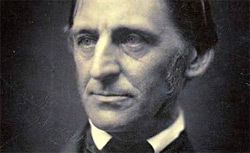Seize the Day
Two poets race to make the most of their scarce time on Earth.

Work, some of us declare with some pride and some resignation, is one of life's greatest pleasures. Getting work done feels good. The other side of that pleasure is anxiety: anxiety about failure to get work done, failure even to get around to trying to get work done. The use of time is an issue: the use of each day and, represented by the use of each day, the use of a life.
Poetry about seizing the precious day may specify activities like gathering rosebuds or fulfillment of the poet's erotic intentions. For me, underlying those recreational, floral, sexual imperatives is the poet's deepest craving and anxiety: getting a poem written, which itself embodies anxieties about loving, being loved, living, and the inevitable end of living.
Some poems are explicit about these anxieties. Ralph Waldo Emerson (1803-82), in "Days," expresses very compactly the shame of procrastination and the intense craving, too often evaporated, of accomplishment. I think that the strange, archaic and learned words "pleached" and "fillet" help intensify the feeling: Look it up online, says Emerson (in effect) from the 19th century, to remind yourself how much work of intertwining and binding others have done on dictionaries, in gardens, and in software.
Emerson, on the scale of his title, writes explicitly about a late-afternoon sensation I recognize: "Forgot my morning wishes," he says—if any reader has never felt that, my envious congratulations. On an apparently different scale, John Keats (1795–1821) writes just as explicitly about his anxiety that he will die before has done what he can as a writer. "Gleaning" suggests a small scale, and "high-pilèd books" a large one. Both images are immeasurably more moving because Keats died at the age of 26 and had reasons to anticipate an early death.
But on some level, Emerson's days and Keats' lifetime refer to one thing: the daily pressure and the lifetime's need to fulfill the intentions and capacities of imaginative work. Where the two poets differ most may appear in the resolving lines at the end of each poem. Emerson, with those effective pauses ("I, too late,") attributes the climactic word "scorn" to the most recent Day of the procession. Keats himself has the final emotion in his poem's conclusion, where he thinks until "love and fame to nothingness do sink"—a feeling more mysterious than its distant cousin scorn, and larger.
"Days"
Daughters of Time, the hypocritic Days,
Muffled and dumb like barefoot dervishes,
And marching single in an endless file,
Bring diadems and fagots in their hands.
To each they offer gifts after his will,
Bread, kingdoms, stars, or sky that holds them all.
I, in my pleached garden, watched the pomp,
Forgot my morning wishes, hastily
Took a few herbs and apples, and the Day
Turned and departed silent. I, too late,
Under her solemn fillet saw the scorn.
….….…................….….…—Ralph Waldo Emerson
Click the arrow on the audio player below to hear Robert Pinsky read Ralph Waldo Emerson's "Days." You can also download the recording or subscribe to Slate's Poetry Podcast on iTunes.
"When I Have Fears That I May Cease To Be"
When I have fears that I may cease to be
....Before my pen has gleaned my teeming brain,
Before high-pilèd books, in charactery,
....Hold like rich garners the full ripened grain;
When I behold, upon the night's starred face,
....Huge cloudy symbols of a high romance,
And think that I may never live to trace
....Their shadows with the magic hand of chance;
And when I feel, fair creature of an hour,
....That I shall never look upon thee more,
Never have relish in the fairy power
....Of unreflecting love—then on the shore
Of the wide world I stand alone, and think
Till love and fame to nothingness do sink.
….….…................….….…—John Keats
Click the arrow on the audio player below to hear Robert Pinsky read John Keats' "When I Have Fears That I May Cease To Be." You can also download the recording or subscribe to Slate's Poetry Podcast on iTunes.
Slate Poetry Editor Robert Pinsky will be joining in discussion of these poems by Ralph Waldo Emerson and John Keats this week. Post your questions and comments on the work, and he'll respond and participate. You can also browse "Fray" discussions of previous classic poems. For Slate's poetry submission guidelines, click here. Click here to visit Robert Pinsky's Favorite Poem Project site.